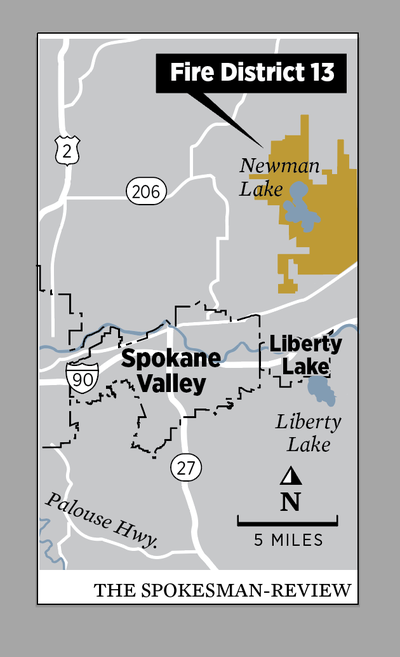Spokane County Fire District 13 in desperate need of funding increase

Most levies that pass increase the amount of money residents have to pay, but the proposed levy increase in Spokane County Fire District 13 might do the opposite, according to the fire chief.
Voters in the district surrounding Newman Lake have rejected numerous attempts to increase the levy in recent years. If it doesn’t pass this time, Fire Chief Daron Bement said cuts will happen and insurance companies likely will hike home insurance rates.
Bement said the Washington Surveying & Rating Bureau likely would drop the fire district’s rating, which is an estimate of the effective coverage and power of the fire department.
“We would have to cut services, or personnel, would lose WSRB protection class rating, so we would go from a protection class 6 to most likely a protection class of 8,” Bement said.
The Spokane Valley Fire Department, for instance, has been rated a 2, the best rating in Eastern Washington.
The loss of protection class would lead to higher insurance rates for homeowners, Bement said.
“We have gotten confirmation from several insurance companies that the average rate of increase would be about $1,000 to $1,200 per year,” he said.
This mostly volunteer fire department covers 23 square miles around Newman Lake. It has two full-time firefighting staff – the chief and a fire captain – and one full-time administrative assistant.
Bement blames confusion regarding the tax as the reason why it has been so unsuccessful in the past.
“The average voter (has) difficulty understanding how the levy compression affects them and how the district actually receives money. “
The current tax would rise from 79 cents per $1,000 property value to $1.10, resulting in $217 more a year for the owner of a $700,000 property. The tax can increase by 3% each of the following years.
Two residents of the district, Dennis Gleckler and Jerry Le Grand, wrote in opposition to the tax in the county’s official election guide. Attempts made to reach them for further comment were unsuccessful.
“Somewhere in their overzealous drive for a full-time fire department they seem to have lost sight of just how limited resources are in Newman Lake,” Gleckler’s and Le Grand’s committee opposed to the tax wrote in the election guide.
Bement hopes that voters this time will consider the possible increases in their insurance rates if the tax fails.
“We feel pretty hopeful that at this point,” Bement said. “We’ve met most of the asks of the community, and we have garnered more support this time around than in the last few attempts.”
If passed, the levy would provide much-needed funding to the department that would make up for the rise in costs the department has been facing recently, the chief said.
“Just operational costs in general have skyrocketed well over 100% for our department,” Bement said, blaming inflation.
Additionally, the levy would fund programs that improve the coverage and service of the fire department, such as the district’s live-in resident firefighter program, which was discontinued due to the lack of funding. In the program, volunteer firefighters live at the station, allowing them to more quickly respond to calls.
“Our biggest struggle is we don’t have our live-in resident firefighter program,” he said. “It would have people here at the station hopefully more often overnight than not.”
Bement said the current fire department fully operates “Monday through Friday, 8 a.m. to 5 p.m., and the rest is covered nights and weekends by volunteers from home.”
He said that even now, the volunteer department provides similar care and coverage as a full-time fire department, despite having their own jobs on top of volunteering.
“Everything that they do for the fire department is on top of everything that they do to, you know, live their life and pay their bills and work their 9-to-5 to jobs. So volunteers are putting in more effort than … full-time career firefighters”
Volunteer fire departments are also much more forgiving on the wallets of taxpayers.
“Across the nation, volunteer fire departments save taxpayers billions of dollars,” Bement said. “The training requirements are the same and the amount of knowledge that they have to know is the same.”
The pay for the volunteer firefighters is based on the amount of calls they take, he said.
“They get $10 per call, whether it’s 20 minutes or five hours, they get the same $10 … at the end of the year towards November, we count how many calls they went on and then cut them a check.”
Bement is more hopeful that voters that care about the tax in the district will turn up this time around.
“Voter turnout sometimes is what hurts us more than a solid yes or no vote. You know, people just aren’t showing up to the polls,” he said. “That hurts a lot too. It hurts more when you’re in a smaller area like ours and we have fewer people. I think our last voter turnout seemed to be about 50%. It would be nice to see more people involved.”